Organisational Behaviour: Culture, Power, Politics, and Team Dynamics
VerifiedAdded on 2023/06/12
|15
|5193
|143
Report
AI Summary
This report provides an in-depth analysis of organisational behaviour, focusing on the impact of organisational culture, power dynamics, and politics on individual and team behaviour within the context of Marks and Spencer. It evaluates content and process theories of motivation, examining how motivational techniques enable effective goal achievement. The report critically assesses the relationship between culture, politics, power, and motivation in fostering team and organisational success, offering justified recommendations. Furthermore, it explores team development theories, highlighting the concepts and philosophies of organisational behaviour that influence behaviour positively and negatively in the workplace. The analysis includes frameworks such as Hofstede's cultural dimensions, Maslow's hierarchy of needs, and Equity Theory, providing a comprehensive understanding of organisational dynamics and their impact on performance.
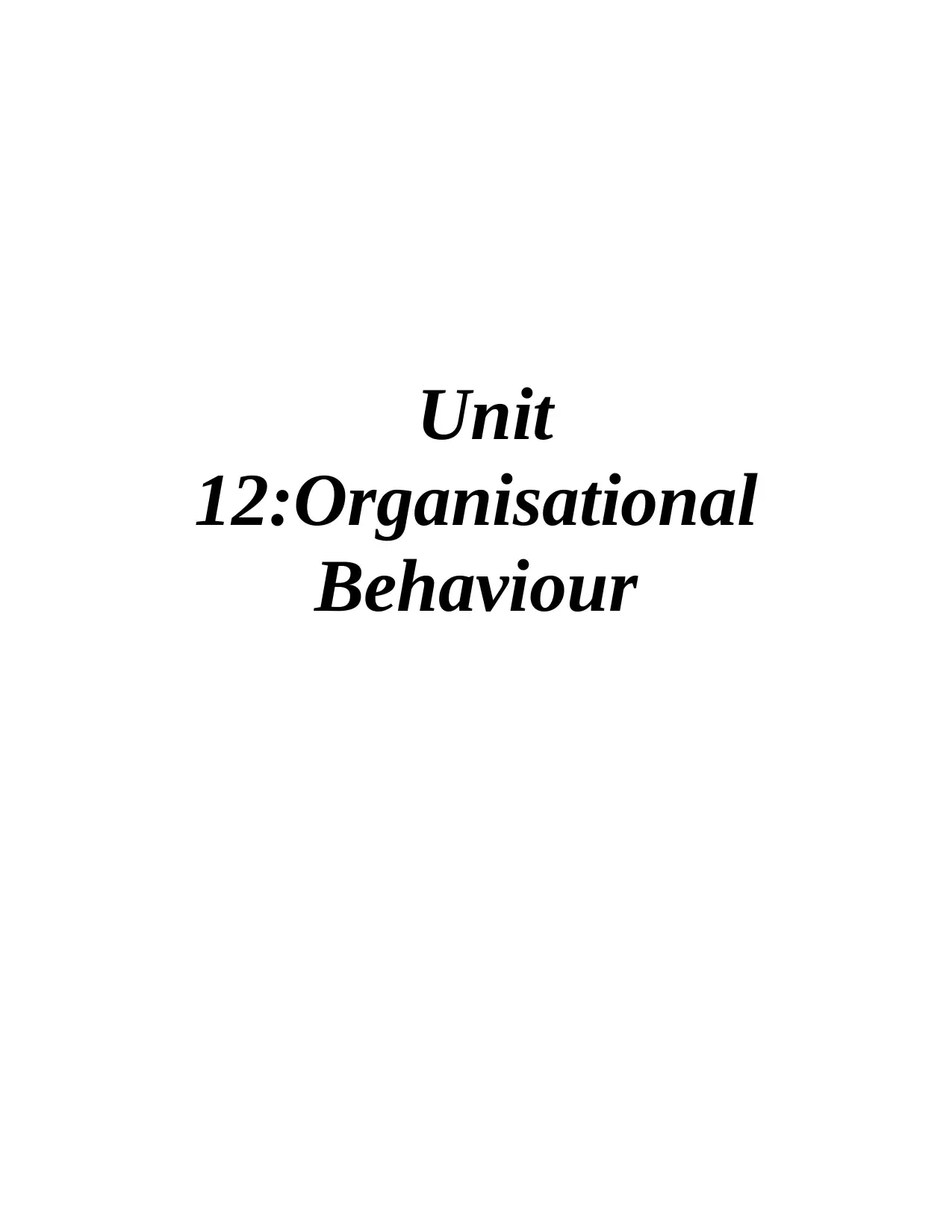
Unit
12:Organisational
Behaviour
12:Organisational
Behaviour
Paraphrase This Document
Need a fresh take? Get an instant paraphrase of this document with our AI Paraphraser
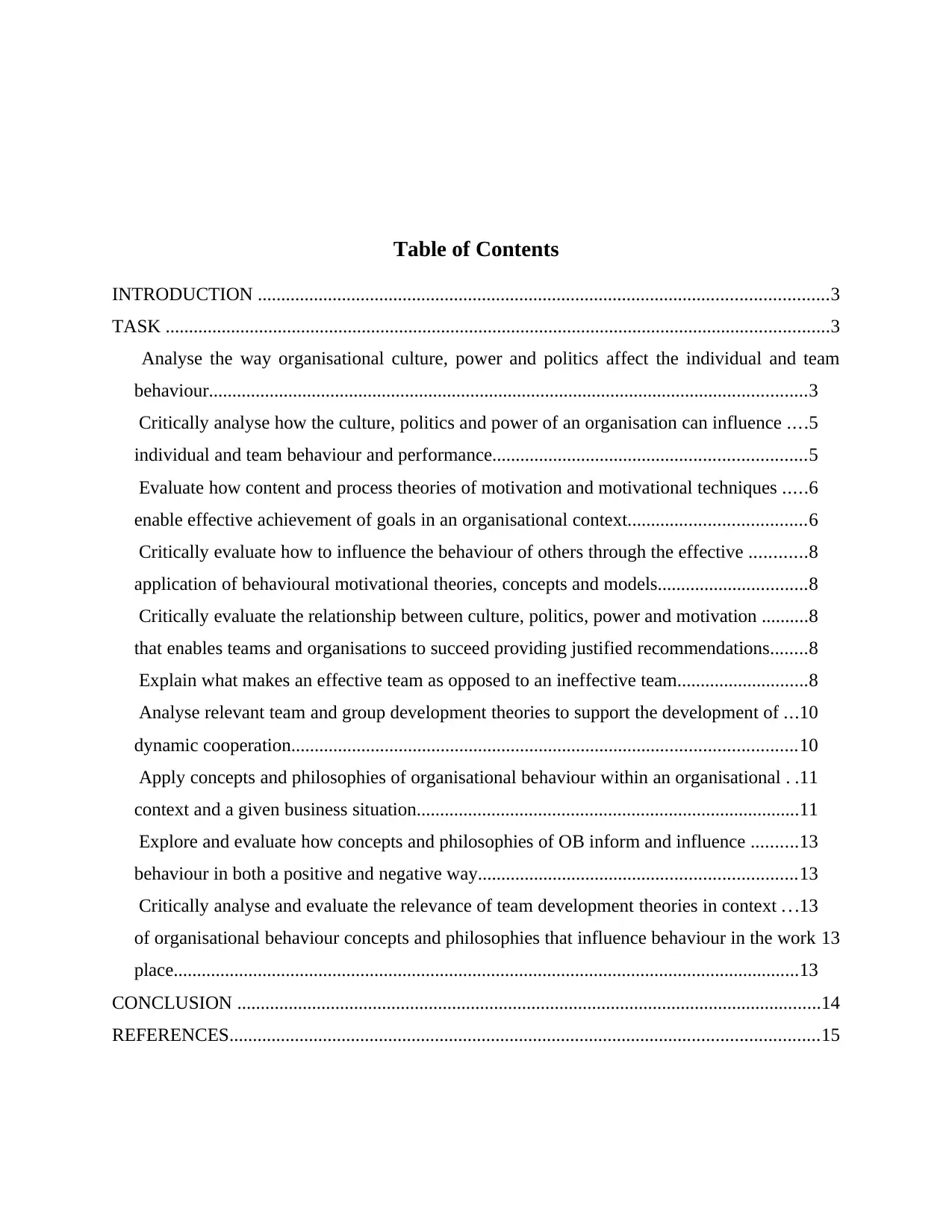
Table of Contents
INTRODUCTION ..........................................................................................................................3
TASK ..............................................................................................................................................3
Analyse the way organisational culture, power and politics affect the individual and team
behaviour................................................................................................................................3
Critically analyse how the culture, politics and power of an organisation can influence ....5
individual and team behaviour and performance...................................................................5
Evaluate how content and process theories of motivation and motivational techniques .....6
enable effective achievement of goals in an organisational context......................................6
Critically evaluate how to influence the behaviour of others through the effective ............8
application of behavioural motivational theories, concepts and models................................8
Critically evaluate the relationship between culture, politics, power and motivation ..........8
that enables teams and organisations to succeed providing justified recommendations........8
Explain what makes an effective team as opposed to an ineffective team............................8
Analyse relevant team and group development theories to support the development of ...10
dynamic cooperation............................................................................................................10
Apply concepts and philosophies of organisational behaviour within an organisational . .11
context and a given business situation..................................................................................11
Explore and evaluate how concepts and philosophies of OB inform and influence ..........13
behaviour in both a positive and negative way....................................................................13
Critically analyse and evaluate the relevance of team development theories in context . . .13
of organisational behaviour concepts and philosophies that influence behaviour in the work 13
place......................................................................................................................................13
CONCLUSION .............................................................................................................................14
REFERENCES..............................................................................................................................15
INTRODUCTION ..........................................................................................................................3
TASK ..............................................................................................................................................3
Analyse the way organisational culture, power and politics affect the individual and team
behaviour................................................................................................................................3
Critically analyse how the culture, politics and power of an organisation can influence ....5
individual and team behaviour and performance...................................................................5
Evaluate how content and process theories of motivation and motivational techniques .....6
enable effective achievement of goals in an organisational context......................................6
Critically evaluate how to influence the behaviour of others through the effective ............8
application of behavioural motivational theories, concepts and models................................8
Critically evaluate the relationship between culture, politics, power and motivation ..........8
that enables teams and organisations to succeed providing justified recommendations........8
Explain what makes an effective team as opposed to an ineffective team............................8
Analyse relevant team and group development theories to support the development of ...10
dynamic cooperation............................................................................................................10
Apply concepts and philosophies of organisational behaviour within an organisational . .11
context and a given business situation..................................................................................11
Explore and evaluate how concepts and philosophies of OB inform and influence ..........13
behaviour in both a positive and negative way....................................................................13
Critically analyse and evaluate the relevance of team development theories in context . . .13
of organisational behaviour concepts and philosophies that influence behaviour in the work 13
place......................................................................................................................................13
CONCLUSION .............................................................................................................................14
REFERENCES..............................................................................................................................15
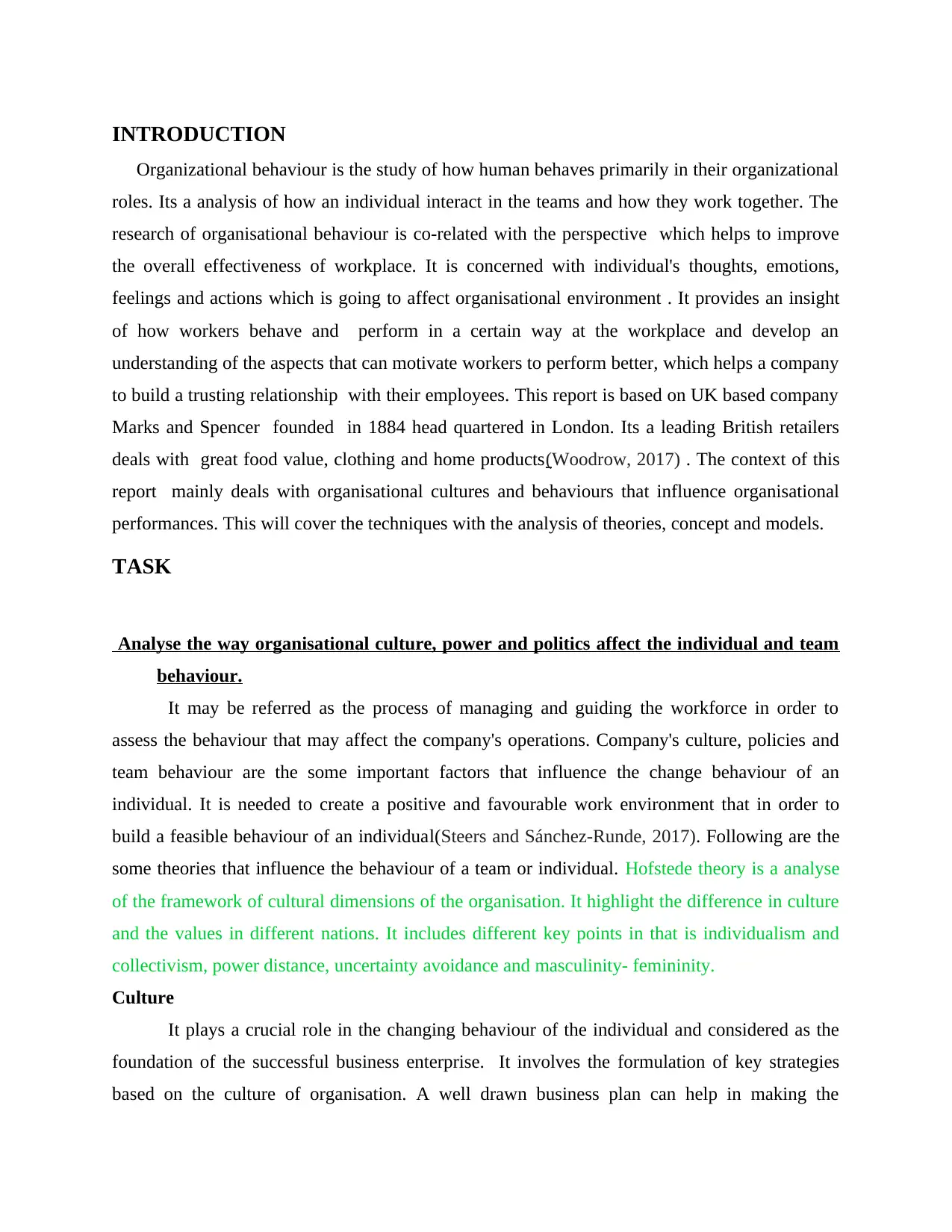
INTRODUCTION
Organizational behaviour is the study of how human behaves primarily in their organizational
roles. Its a analysis of how an individual interact in the teams and how they work together. The
research of organisational behaviour is co-related with the perspective which helps to improve
the overall effectiveness of workplace. It is concerned with individual's thoughts, emotions,
feelings and actions which is going to affect organisational environment . It provides an insight
of how workers behave and perform in a certain way at the workplace and develop an
understanding of the aspects that can motivate workers to perform better, which helps a company
to build a trusting relationship with their employees. This report is based on UK based company
Marks and Spencer founded in 1884 head quartered in London. Its a leading British retailers
deals with great food value, clothing and home products(Woodrow, 2017) . The context of this
report mainly deals with organisational cultures and behaviours that influence organisational
performances. This will cover the techniques with the analysis of theories, concept and models.
TASK
Analyse the way organisational culture, power and politics affect the individual and team
behaviour.
It may be referred as the process of managing and guiding the workforce in order to
assess the behaviour that may affect the company's operations. Company's culture, policies and
team behaviour are the some important factors that influence the change behaviour of an
individual. It is needed to create a positive and favourable work environment that in order to
build a feasible behaviour of an individual(Steers and Sánchez‐Runde, 2017). Following are the
some theories that influence the behaviour of a team or individual. Hofstede theory is a analyse
of the framework of cultural dimensions of the organisation. It highlight the difference in culture
and the values in different nations. It includes different key points in that is individualism and
collectivism, power distance, uncertainty avoidance and masculinity- femininity.
Culture
It plays a crucial role in the changing behaviour of the individual and considered as the
foundation of the successful business enterprise. It involves the formulation of key strategies
based on the culture of organisation. A well drawn business plan can help in making the
Organizational behaviour is the study of how human behaves primarily in their organizational
roles. Its a analysis of how an individual interact in the teams and how they work together. The
research of organisational behaviour is co-related with the perspective which helps to improve
the overall effectiveness of workplace. It is concerned with individual's thoughts, emotions,
feelings and actions which is going to affect organisational environment . It provides an insight
of how workers behave and perform in a certain way at the workplace and develop an
understanding of the aspects that can motivate workers to perform better, which helps a company
to build a trusting relationship with their employees. This report is based on UK based company
Marks and Spencer founded in 1884 head quartered in London. Its a leading British retailers
deals with great food value, clothing and home products(Woodrow, 2017) . The context of this
report mainly deals with organisational cultures and behaviours that influence organisational
performances. This will cover the techniques with the analysis of theories, concept and models.
TASK
Analyse the way organisational culture, power and politics affect the individual and team
behaviour.
It may be referred as the process of managing and guiding the workforce in order to
assess the behaviour that may affect the company's operations. Company's culture, policies and
team behaviour are the some important factors that influence the change behaviour of an
individual. It is needed to create a positive and favourable work environment that in order to
build a feasible behaviour of an individual(Steers and Sánchez‐Runde, 2017). Following are the
some theories that influence the behaviour of a team or individual. Hofstede theory is a analyse
of the framework of cultural dimensions of the organisation. It highlight the difference in culture
and the values in different nations. It includes different key points in that is individualism and
collectivism, power distance, uncertainty avoidance and masculinity- femininity.
Culture
It plays a crucial role in the changing behaviour of the individual and considered as the
foundation of the successful business enterprise. It involves the formulation of key strategies
based on the culture of organisation. A well drawn business plan can help in making the
⊘ This is a preview!⊘
Do you want full access?
Subscribe today to unlock all pages.

Trusted by 1+ million students worldwide
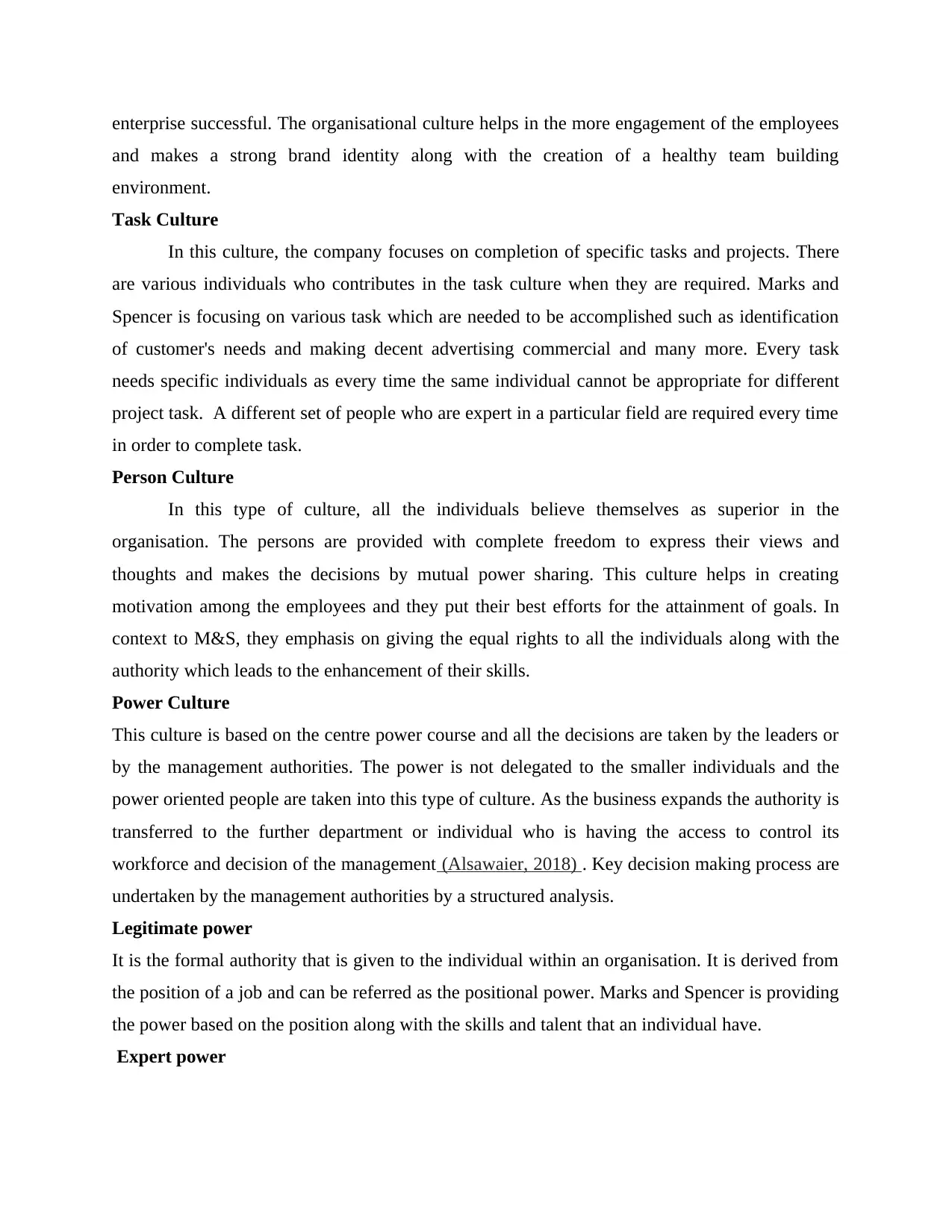
enterprise successful. The organisational culture helps in the more engagement of the employees
and makes a strong brand identity along with the creation of a healthy team building
environment.
Task Culture
In this culture, the company focuses on completion of specific tasks and projects. There
are various individuals who contributes in the task culture when they are required. Marks and
Spencer is focusing on various task which are needed to be accomplished such as identification
of customer's needs and making decent advertising commercial and many more. Every task
needs specific individuals as every time the same individual cannot be appropriate for different
project task. A different set of people who are expert in a particular field are required every time
in order to complete task.
Person Culture
In this type of culture, all the individuals believe themselves as superior in the
organisation. The persons are provided with complete freedom to express their views and
thoughts and makes the decisions by mutual power sharing. This culture helps in creating
motivation among the employees and they put their best efforts for the attainment of goals. In
context to M&S, they emphasis on giving the equal rights to all the individuals along with the
authority which leads to the enhancement of their skills.
Power Culture
This culture is based on the centre power course and all the decisions are taken by the leaders or
by the management authorities. The power is not delegated to the smaller individuals and the
power oriented people are taken into this type of culture. As the business expands the authority is
transferred to the further department or individual who is having the access to control its
workforce and decision of the management (Alsawaier, 2018) . Key decision making process are
undertaken by the management authorities by a structured analysis.
Legitimate power
It is the formal authority that is given to the individual within an organisation. It is derived from
the position of a job and can be referred as the positional power. Marks and Spencer is providing
the power based on the position along with the skills and talent that an individual have.
Expert power
and makes a strong brand identity along with the creation of a healthy team building
environment.
Task Culture
In this culture, the company focuses on completion of specific tasks and projects. There
are various individuals who contributes in the task culture when they are required. Marks and
Spencer is focusing on various task which are needed to be accomplished such as identification
of customer's needs and making decent advertising commercial and many more. Every task
needs specific individuals as every time the same individual cannot be appropriate for different
project task. A different set of people who are expert in a particular field are required every time
in order to complete task.
Person Culture
In this type of culture, all the individuals believe themselves as superior in the
organisation. The persons are provided with complete freedom to express their views and
thoughts and makes the decisions by mutual power sharing. This culture helps in creating
motivation among the employees and they put their best efforts for the attainment of goals. In
context to M&S, they emphasis on giving the equal rights to all the individuals along with the
authority which leads to the enhancement of their skills.
Power Culture
This culture is based on the centre power course and all the decisions are taken by the leaders or
by the management authorities. The power is not delegated to the smaller individuals and the
power oriented people are taken into this type of culture. As the business expands the authority is
transferred to the further department or individual who is having the access to control its
workforce and decision of the management (Alsawaier, 2018) . Key decision making process are
undertaken by the management authorities by a structured analysis.
Legitimate power
It is the formal authority that is given to the individual within an organisation. It is derived from
the position of a job and can be referred as the positional power. Marks and Spencer is providing
the power based on the position along with the skills and talent that an individual have.
Expert power
Paraphrase This Document
Need a fresh take? Get an instant paraphrase of this document with our AI Paraphraser
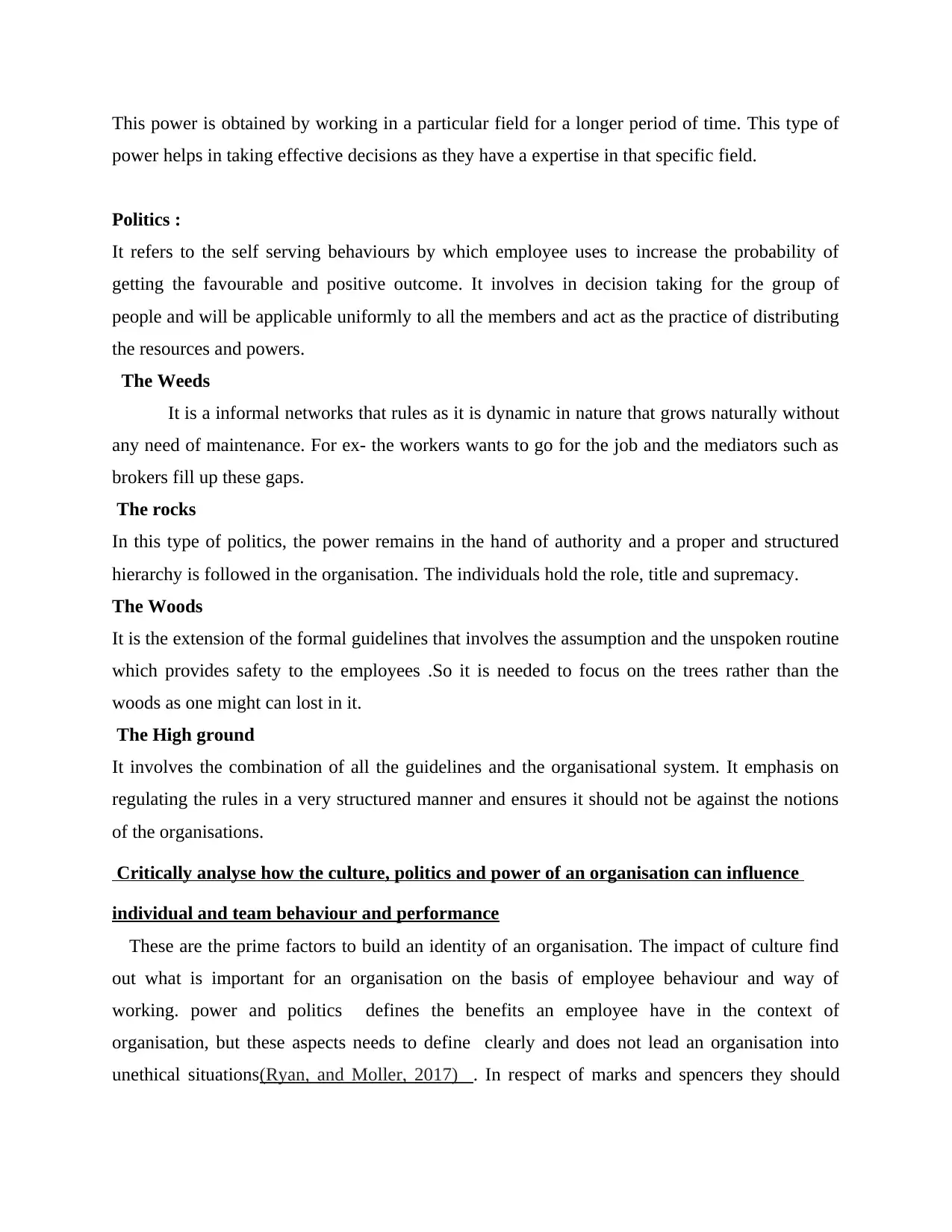
This power is obtained by working in a particular field for a longer period of time. This type of
power helps in taking effective decisions as they have a expertise in that specific field.
Politics :
It refers to the self serving behaviours by which employee uses to increase the probability of
getting the favourable and positive outcome. It involves in decision taking for the group of
people and will be applicable uniformly to all the members and act as the practice of distributing
the resources and powers.
The Weeds
It is a informal networks that rules as it is dynamic in nature that grows naturally without
any need of maintenance. For ex- the workers wants to go for the job and the mediators such as
brokers fill up these gaps.
The rocks
In this type of politics, the power remains in the hand of authority and a proper and structured
hierarchy is followed in the organisation. The individuals hold the role, title and supremacy.
The Woods
It is the extension of the formal guidelines that involves the assumption and the unspoken routine
which provides safety to the employees .So it is needed to focus on the trees rather than the
woods as one might can lost in it.
The High ground
It involves the combination of all the guidelines and the organisational system. It emphasis on
regulating the rules in a very structured manner and ensures it should not be against the notions
of the organisations.
Critically analyse how the culture, politics and power of an organisation can influence
individual and team behaviour and performance
These are the prime factors to build an identity of an organisation. The impact of culture find
out what is important for an organisation on the basis of employee behaviour and way of
working. power and politics defines the benefits an employee have in the context of
organisation, but these aspects needs to define clearly and does not lead an organisation into
unethical situations(Ryan, and Moller, 2017) . In respect of marks and spencers they should
power helps in taking effective decisions as they have a expertise in that specific field.
Politics :
It refers to the self serving behaviours by which employee uses to increase the probability of
getting the favourable and positive outcome. It involves in decision taking for the group of
people and will be applicable uniformly to all the members and act as the practice of distributing
the resources and powers.
The Weeds
It is a informal networks that rules as it is dynamic in nature that grows naturally without
any need of maintenance. For ex- the workers wants to go for the job and the mediators such as
brokers fill up these gaps.
The rocks
In this type of politics, the power remains in the hand of authority and a proper and structured
hierarchy is followed in the organisation. The individuals hold the role, title and supremacy.
The Woods
It is the extension of the formal guidelines that involves the assumption and the unspoken routine
which provides safety to the employees .So it is needed to focus on the trees rather than the
woods as one might can lost in it.
The High ground
It involves the combination of all the guidelines and the organisational system. It emphasis on
regulating the rules in a very structured manner and ensures it should not be against the notions
of the organisations.
Critically analyse how the culture, politics and power of an organisation can influence
individual and team behaviour and performance
These are the prime factors to build an identity of an organisation. The impact of culture find
out what is important for an organisation on the basis of employee behaviour and way of
working. power and politics defines the benefits an employee have in the context of
organisation, but these aspects needs to define clearly and does not lead an organisation into
unethical situations(Ryan, and Moller, 2017) . In respect of marks and spencers they should
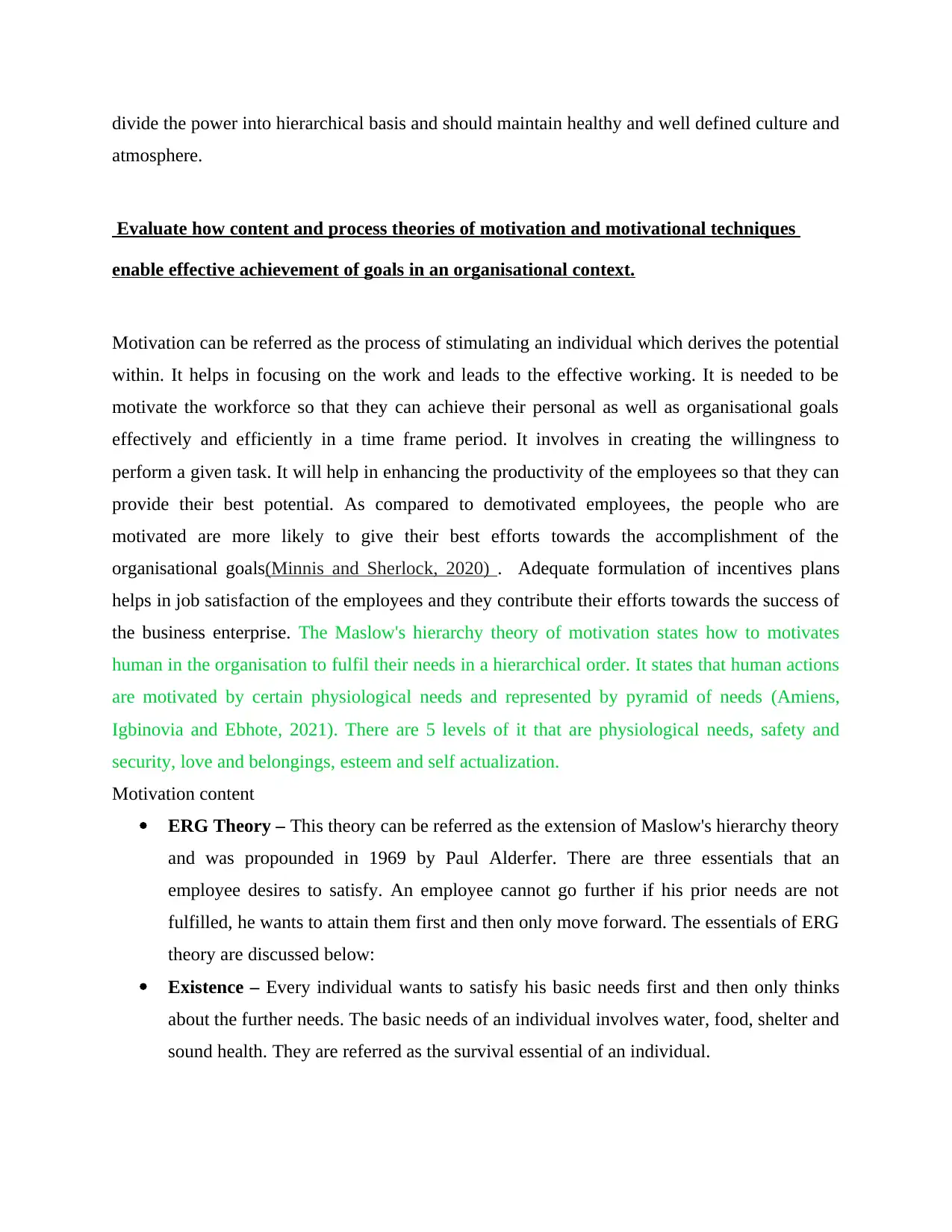
divide the power into hierarchical basis and should maintain healthy and well defined culture and
atmosphere.
Evaluate how content and process theories of motivation and motivational techniques
enable effective achievement of goals in an organisational context.
Motivation can be referred as the process of stimulating an individual which derives the potential
within. It helps in focusing on the work and leads to the effective working. It is needed to be
motivate the workforce so that they can achieve their personal as well as organisational goals
effectively and efficiently in a time frame period. It involves in creating the willingness to
perform a given task. It will help in enhancing the productivity of the employees so that they can
provide their best potential. As compared to demotivated employees, the people who are
motivated are more likely to give their best efforts towards the accomplishment of the
organisational goals(Minnis and Sherlock, 2020) . Adequate formulation of incentives plans
helps in job satisfaction of the employees and they contribute their efforts towards the success of
the business enterprise. The Maslow's hierarchy theory of motivation states how to motivates
human in the organisation to fulfil their needs in a hierarchical order. It states that human actions
are motivated by certain physiological needs and represented by pyramid of needs (Amiens,
Igbinovia and Ebhote, 2021). There are 5 levels of it that are physiological needs, safety and
security, love and belongings, esteem and self actualization.
Motivation content
ERG Theory – This theory can be referred as the extension of Maslow's hierarchy theory
and was propounded in 1969 by Paul Alderfer. There are three essentials that an
employee desires to satisfy. An employee cannot go further if his prior needs are not
fulfilled, he wants to attain them first and then only move forward. The essentials of ERG
theory are discussed below:
Existence – Every individual wants to satisfy his basic needs first and then only thinks
about the further needs. The basic needs of an individual involves water, food, shelter and
sound health. They are referred as the survival essential of an individual.
atmosphere.
Evaluate how content and process theories of motivation and motivational techniques
enable effective achievement of goals in an organisational context.
Motivation can be referred as the process of stimulating an individual which derives the potential
within. It helps in focusing on the work and leads to the effective working. It is needed to be
motivate the workforce so that they can achieve their personal as well as organisational goals
effectively and efficiently in a time frame period. It involves in creating the willingness to
perform a given task. It will help in enhancing the productivity of the employees so that they can
provide their best potential. As compared to demotivated employees, the people who are
motivated are more likely to give their best efforts towards the accomplishment of the
organisational goals(Minnis and Sherlock, 2020) . Adequate formulation of incentives plans
helps in job satisfaction of the employees and they contribute their efforts towards the success of
the business enterprise. The Maslow's hierarchy theory of motivation states how to motivates
human in the organisation to fulfil their needs in a hierarchical order. It states that human actions
are motivated by certain physiological needs and represented by pyramid of needs (Amiens,
Igbinovia and Ebhote, 2021). There are 5 levels of it that are physiological needs, safety and
security, love and belongings, esteem and self actualization.
Motivation content
ERG Theory – This theory can be referred as the extension of Maslow's hierarchy theory
and was propounded in 1969 by Paul Alderfer. There are three essentials that an
employee desires to satisfy. An employee cannot go further if his prior needs are not
fulfilled, he wants to attain them first and then only move forward. The essentials of ERG
theory are discussed below:
Existence – Every individual wants to satisfy his basic needs first and then only thinks
about the further needs. The basic needs of an individual involves water, food, shelter and
sound health. They are referred as the survival essential of an individual.
⊘ This is a preview!⊘
Do you want full access?
Subscribe today to unlock all pages.

Trusted by 1+ million students worldwide
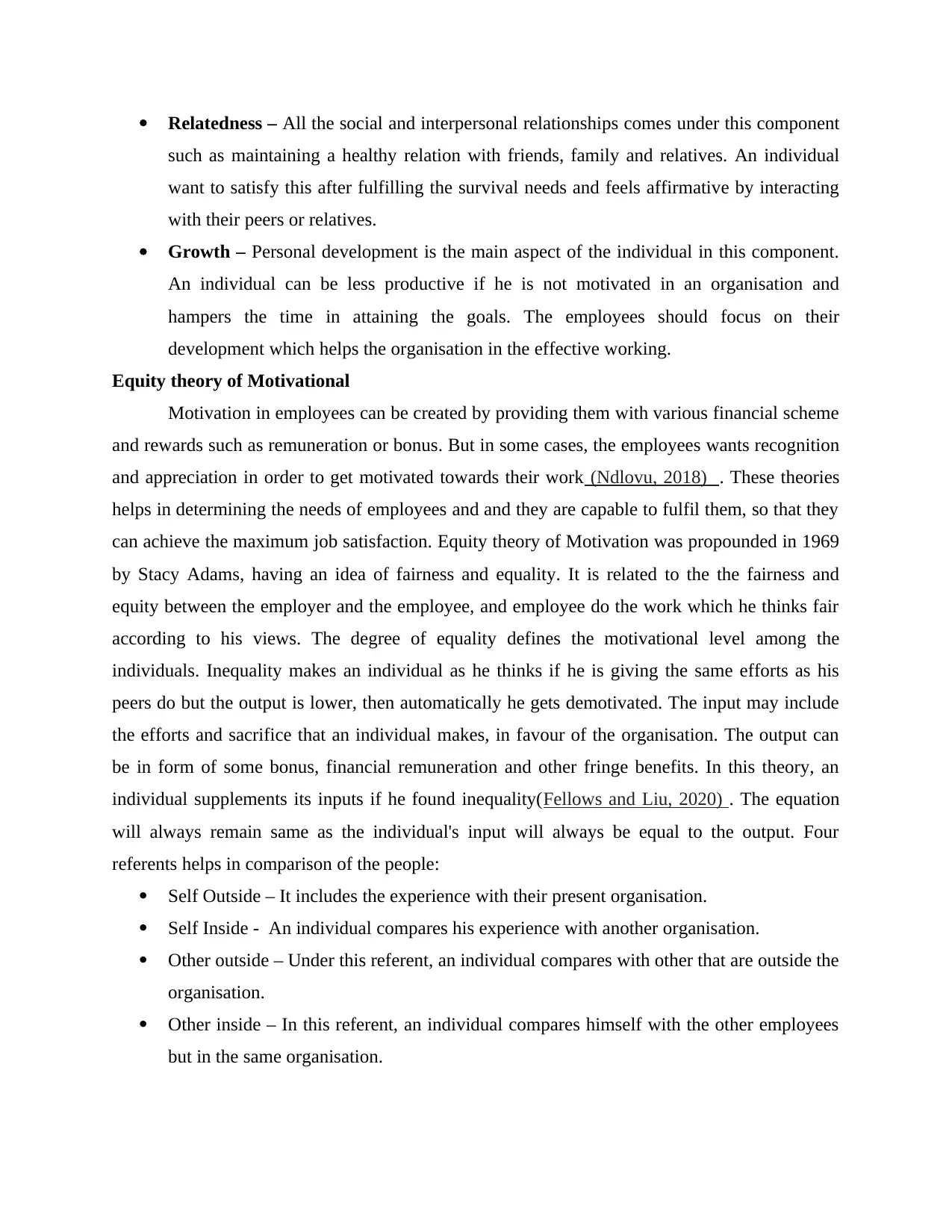
Relatedness – All the social and interpersonal relationships comes under this component
such as maintaining a healthy relation with friends, family and relatives. An individual
want to satisfy this after fulfilling the survival needs and feels affirmative by interacting
with their peers or relatives.
Growth – Personal development is the main aspect of the individual in this component.
An individual can be less productive if he is not motivated in an organisation and
hampers the time in attaining the goals. The employees should focus on their
development which helps the organisation in the effective working.
Equity theory of Motivational
Motivation in employees can be created by providing them with various financial scheme
and rewards such as remuneration or bonus. But in some cases, the employees wants recognition
and appreciation in order to get motivated towards their work (Ndlovu, 2018) . These theories
helps in determining the needs of employees and and they are capable to fulfil them, so that they
can achieve the maximum job satisfaction. Equity theory of Motivation was propounded in 1969
by Stacy Adams, having an idea of fairness and equality. It is related to the the fairness and
equity between the employer and the employee, and employee do the work which he thinks fair
according to his views. The degree of equality defines the motivational level among the
individuals. Inequality makes an individual as he thinks if he is giving the same efforts as his
peers do but the output is lower, then automatically he gets demotivated. The input may include
the efforts and sacrifice that an individual makes, in favour of the organisation. The output can
be in form of some bonus, financial remuneration and other fringe benefits. In this theory, an
individual supplements its inputs if he found inequality(Fellows and Liu, 2020) . The equation
will always remain same as the individual's input will always be equal to the output. Four
referents helps in comparison of the people:
Self Outside – It includes the experience with their present organisation.
Self Inside - An individual compares his experience with another organisation.
Other outside – Under this referent, an individual compares with other that are outside the
organisation.
Other inside – In this referent, an individual compares himself with the other employees
but in the same organisation.
such as maintaining a healthy relation with friends, family and relatives. An individual
want to satisfy this after fulfilling the survival needs and feels affirmative by interacting
with their peers or relatives.
Growth – Personal development is the main aspect of the individual in this component.
An individual can be less productive if he is not motivated in an organisation and
hampers the time in attaining the goals. The employees should focus on their
development which helps the organisation in the effective working.
Equity theory of Motivational
Motivation in employees can be created by providing them with various financial scheme
and rewards such as remuneration or bonus. But in some cases, the employees wants recognition
and appreciation in order to get motivated towards their work (Ndlovu, 2018) . These theories
helps in determining the needs of employees and and they are capable to fulfil them, so that they
can achieve the maximum job satisfaction. Equity theory of Motivation was propounded in 1969
by Stacy Adams, having an idea of fairness and equality. It is related to the the fairness and
equity between the employer and the employee, and employee do the work which he thinks fair
according to his views. The degree of equality defines the motivational level among the
individuals. Inequality makes an individual as he thinks if he is giving the same efforts as his
peers do but the output is lower, then automatically he gets demotivated. The input may include
the efforts and sacrifice that an individual makes, in favour of the organisation. The output can
be in form of some bonus, financial remuneration and other fringe benefits. In this theory, an
individual supplements its inputs if he found inequality(Fellows and Liu, 2020) . The equation
will always remain same as the individual's input will always be equal to the output. Four
referents helps in comparison of the people:
Self Outside – It includes the experience with their present organisation.
Self Inside - An individual compares his experience with another organisation.
Other outside – Under this referent, an individual compares with other that are outside the
organisation.
Other inside – In this referent, an individual compares himself with the other employees
but in the same organisation.
Paraphrase This Document
Need a fresh take? Get an instant paraphrase of this document with our AI Paraphraser
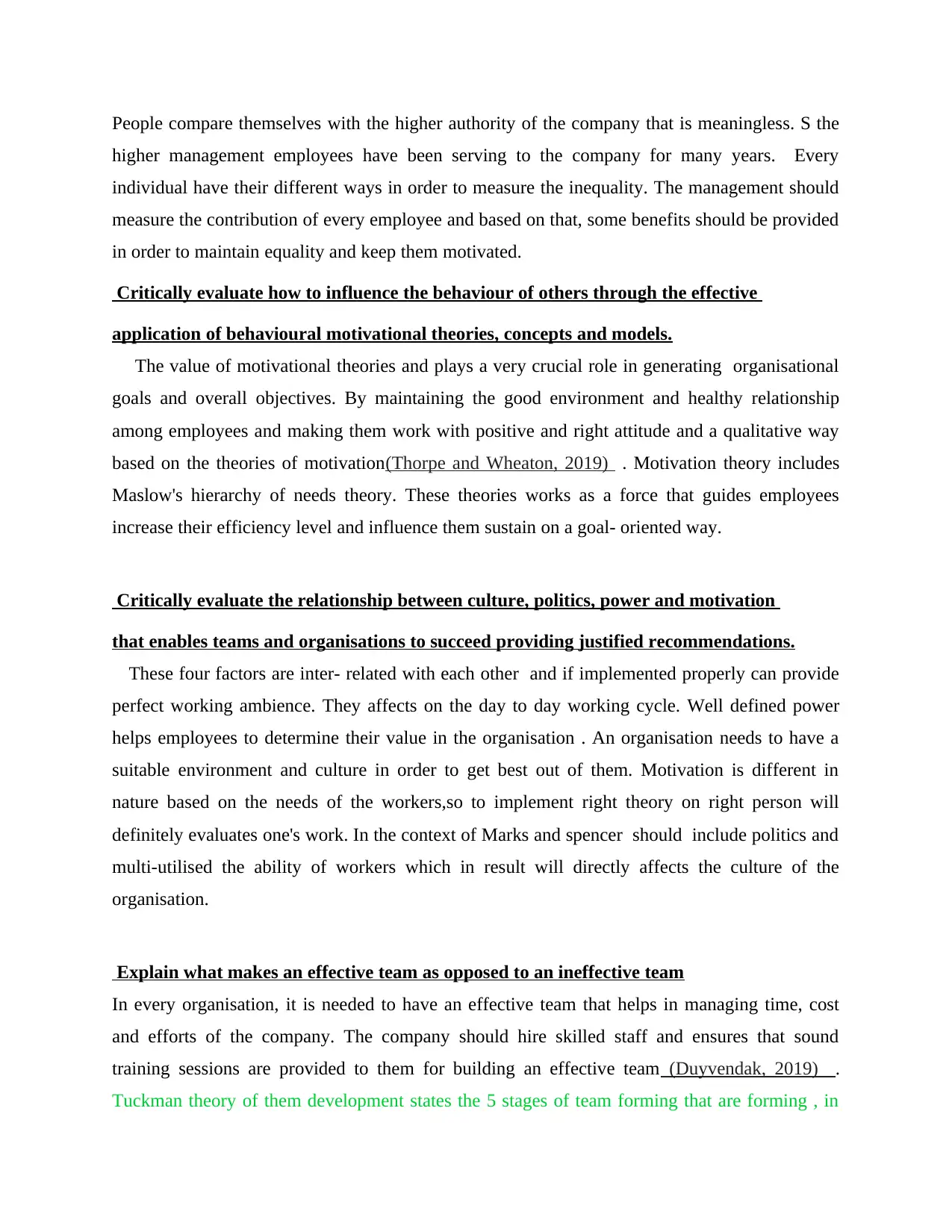
People compare themselves with the higher authority of the company that is meaningless. S the
higher management employees have been serving to the company for many years. Every
individual have their different ways in order to measure the inequality. The management should
measure the contribution of every employee and based on that, some benefits should be provided
in order to maintain equality and keep them motivated.
Critically evaluate how to influence the behaviour of others through the effective
application of behavioural motivational theories, concepts and models.
The value of motivational theories and plays a very crucial role in generating organisational
goals and overall objectives. By maintaining the good environment and healthy relationship
among employees and making them work with positive and right attitude and a qualitative way
based on the theories of motivation(Thorpe and Wheaton, 2019) . Motivation theory includes
Maslow's hierarchy of needs theory. These theories works as a force that guides employees
increase their efficiency level and influence them sustain on a goal- oriented way.
Critically evaluate the relationship between culture, politics, power and motivation
that enables teams and organisations to succeed providing justified recommendations.
These four factors are inter- related with each other and if implemented properly can provide
perfect working ambience. They affects on the day to day working cycle. Well defined power
helps employees to determine their value in the organisation . An organisation needs to have a
suitable environment and culture in order to get best out of them. Motivation is different in
nature based on the needs of the workers,so to implement right theory on right person will
definitely evaluates one's work. In the context of Marks and spencer should include politics and
multi-utilised the ability of workers which in result will directly affects the culture of the
organisation.
Explain what makes an effective team as opposed to an ineffective team
In every organisation, it is needed to have an effective team that helps in managing time, cost
and efforts of the company. The company should hire skilled staff and ensures that sound
training sessions are provided to them for building an effective team (Duyvendak, 2019) .
Tuckman theory of them development states the 5 stages of team forming that are forming , in
higher management employees have been serving to the company for many years. Every
individual have their different ways in order to measure the inequality. The management should
measure the contribution of every employee and based on that, some benefits should be provided
in order to maintain equality and keep them motivated.
Critically evaluate how to influence the behaviour of others through the effective
application of behavioural motivational theories, concepts and models.
The value of motivational theories and plays a very crucial role in generating organisational
goals and overall objectives. By maintaining the good environment and healthy relationship
among employees and making them work with positive and right attitude and a qualitative way
based on the theories of motivation(Thorpe and Wheaton, 2019) . Motivation theory includes
Maslow's hierarchy of needs theory. These theories works as a force that guides employees
increase their efficiency level and influence them sustain on a goal- oriented way.
Critically evaluate the relationship between culture, politics, power and motivation
that enables teams and organisations to succeed providing justified recommendations.
These four factors are inter- related with each other and if implemented properly can provide
perfect working ambience. They affects on the day to day working cycle. Well defined power
helps employees to determine their value in the organisation . An organisation needs to have a
suitable environment and culture in order to get best out of them. Motivation is different in
nature based on the needs of the workers,so to implement right theory on right person will
definitely evaluates one's work. In the context of Marks and spencer should include politics and
multi-utilised the ability of workers which in result will directly affects the culture of the
organisation.
Explain what makes an effective team as opposed to an ineffective team
In every organisation, it is needed to have an effective team that helps in managing time, cost
and efforts of the company. The company should hire skilled staff and ensures that sound
training sessions are provided to them for building an effective team (Duyvendak, 2019) .
Tuckman theory of them development states the 5 stages of team forming that are forming , in
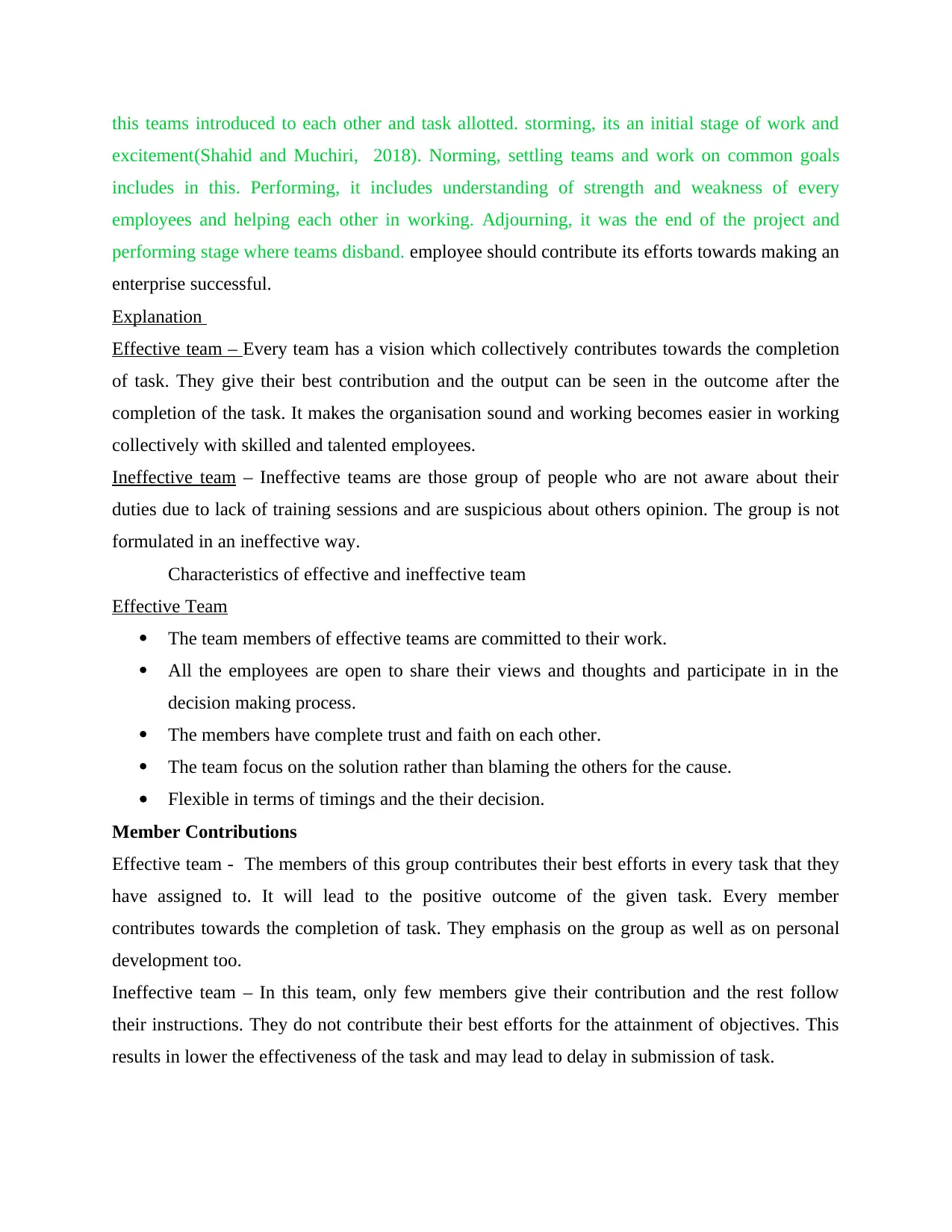
this teams introduced to each other and task allotted. storming, its an initial stage of work and
excitement(Shahid and Muchiri, 2018). Norming, settling teams and work on common goals
includes in this. Performing, it includes understanding of strength and weakness of every
employees and helping each other in working. Adjourning, it was the end of the project and
performing stage where teams disband. employee should contribute its efforts towards making an
enterprise successful.
Explanation
Effective team – Every team has a vision which collectively contributes towards the completion
of task. They give their best contribution and the output can be seen in the outcome after the
completion of the task. It makes the organisation sound and working becomes easier in working
collectively with skilled and talented employees.
Ineffective team – Ineffective teams are those group of people who are not aware about their
duties due to lack of training sessions and are suspicious about others opinion. The group is not
formulated in an ineffective way.
Characteristics of effective and ineffective team
Effective Team
The team members of effective teams are committed to their work.
All the employees are open to share their views and thoughts and participate in in the
decision making process.
The members have complete trust and faith on each other.
The team focus on the solution rather than blaming the others for the cause.
Flexible in terms of timings and the their decision.
Member Contributions
Effective team - The members of this group contributes their best efforts in every task that they
have assigned to. It will lead to the positive outcome of the given task. Every member
contributes towards the completion of task. They emphasis on the group as well as on personal
development too.
Ineffective team – In this team, only few members give their contribution and the rest follow
their instructions. They do not contribute their best efforts for the attainment of objectives. This
results in lower the effectiveness of the task and may lead to delay in submission of task.
excitement(Shahid and Muchiri, 2018). Norming, settling teams and work on common goals
includes in this. Performing, it includes understanding of strength and weakness of every
employees and helping each other in working. Adjourning, it was the end of the project and
performing stage where teams disband. employee should contribute its efforts towards making an
enterprise successful.
Explanation
Effective team – Every team has a vision which collectively contributes towards the completion
of task. They give their best contribution and the output can be seen in the outcome after the
completion of the task. It makes the organisation sound and working becomes easier in working
collectively with skilled and talented employees.
Ineffective team – Ineffective teams are those group of people who are not aware about their
duties due to lack of training sessions and are suspicious about others opinion. The group is not
formulated in an ineffective way.
Characteristics of effective and ineffective team
Effective Team
The team members of effective teams are committed to their work.
All the employees are open to share their views and thoughts and participate in in the
decision making process.
The members have complete trust and faith on each other.
The team focus on the solution rather than blaming the others for the cause.
Flexible in terms of timings and the their decision.
Member Contributions
Effective team - The members of this group contributes their best efforts in every task that they
have assigned to. It will lead to the positive outcome of the given task. Every member
contributes towards the completion of task. They emphasis on the group as well as on personal
development too.
Ineffective team – In this team, only few members give their contribution and the rest follow
their instructions. They do not contribute their best efforts for the attainment of objectives. This
results in lower the effectiveness of the task and may lead to delay in submission of task.
⊘ This is a preview!⊘
Do you want full access?
Subscribe today to unlock all pages.

Trusted by 1+ million students worldwide
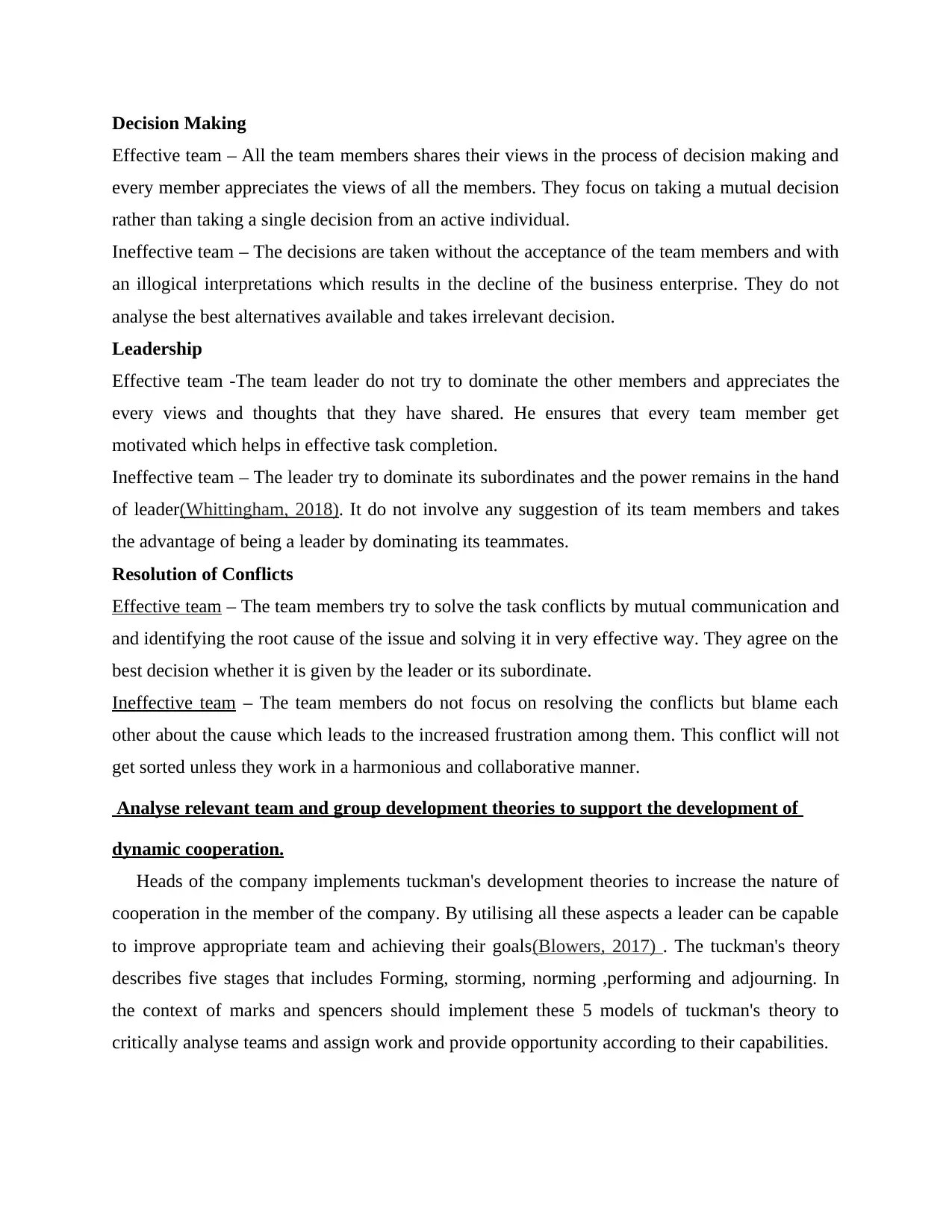
Decision Making
Effective team – All the team members shares their views in the process of decision making and
every member appreciates the views of all the members. They focus on taking a mutual decision
rather than taking a single decision from an active individual.
Ineffective team – The decisions are taken without the acceptance of the team members and with
an illogical interpretations which results in the decline of the business enterprise. They do not
analyse the best alternatives available and takes irrelevant decision.
Leadership
Effective team -The team leader do not try to dominate the other members and appreciates the
every views and thoughts that they have shared. He ensures that every team member get
motivated which helps in effective task completion.
Ineffective team – The leader try to dominate its subordinates and the power remains in the hand
of leader(Whittingham, 2018). It do not involve any suggestion of its team members and takes
the advantage of being a leader by dominating its teammates.
Resolution of Conflicts
Effective team – The team members try to solve the task conflicts by mutual communication and
and identifying the root cause of the issue and solving it in very effective way. They agree on the
best decision whether it is given by the leader or its subordinate.
Ineffective team – The team members do not focus on resolving the conflicts but blame each
other about the cause which leads to the increased frustration among them. This conflict will not
get sorted unless they work in a harmonious and collaborative manner.
Analyse relevant team and group development theories to support the development of
dynamic cooperation.
Heads of the company implements tuckman's development theories to increase the nature of
cooperation in the member of the company. By utilising all these aspects a leader can be capable
to improve appropriate team and achieving their goals(Blowers, 2017) . The tuckman's theory
describes five stages that includes Forming, storming, norming ,performing and adjourning. In
the context of marks and spencers should implement these 5 models of tuckman's theory to
critically analyse teams and assign work and provide opportunity according to their capabilities.
Effective team – All the team members shares their views in the process of decision making and
every member appreciates the views of all the members. They focus on taking a mutual decision
rather than taking a single decision from an active individual.
Ineffective team – The decisions are taken without the acceptance of the team members and with
an illogical interpretations which results in the decline of the business enterprise. They do not
analyse the best alternatives available and takes irrelevant decision.
Leadership
Effective team -The team leader do not try to dominate the other members and appreciates the
every views and thoughts that they have shared. He ensures that every team member get
motivated which helps in effective task completion.
Ineffective team – The leader try to dominate its subordinates and the power remains in the hand
of leader(Whittingham, 2018). It do not involve any suggestion of its team members and takes
the advantage of being a leader by dominating its teammates.
Resolution of Conflicts
Effective team – The team members try to solve the task conflicts by mutual communication and
and identifying the root cause of the issue and solving it in very effective way. They agree on the
best decision whether it is given by the leader or its subordinate.
Ineffective team – The team members do not focus on resolving the conflicts but blame each
other about the cause which leads to the increased frustration among them. This conflict will not
get sorted unless they work in a harmonious and collaborative manner.
Analyse relevant team and group development theories to support the development of
dynamic cooperation.
Heads of the company implements tuckman's development theories to increase the nature of
cooperation in the member of the company. By utilising all these aspects a leader can be capable
to improve appropriate team and achieving their goals(Blowers, 2017) . The tuckman's theory
describes five stages that includes Forming, storming, norming ,performing and adjourning. In
the context of marks and spencers should implement these 5 models of tuckman's theory to
critically analyse teams and assign work and provide opportunity according to their capabilities.
Paraphrase This Document
Need a fresh take? Get an instant paraphrase of this document with our AI Paraphraser
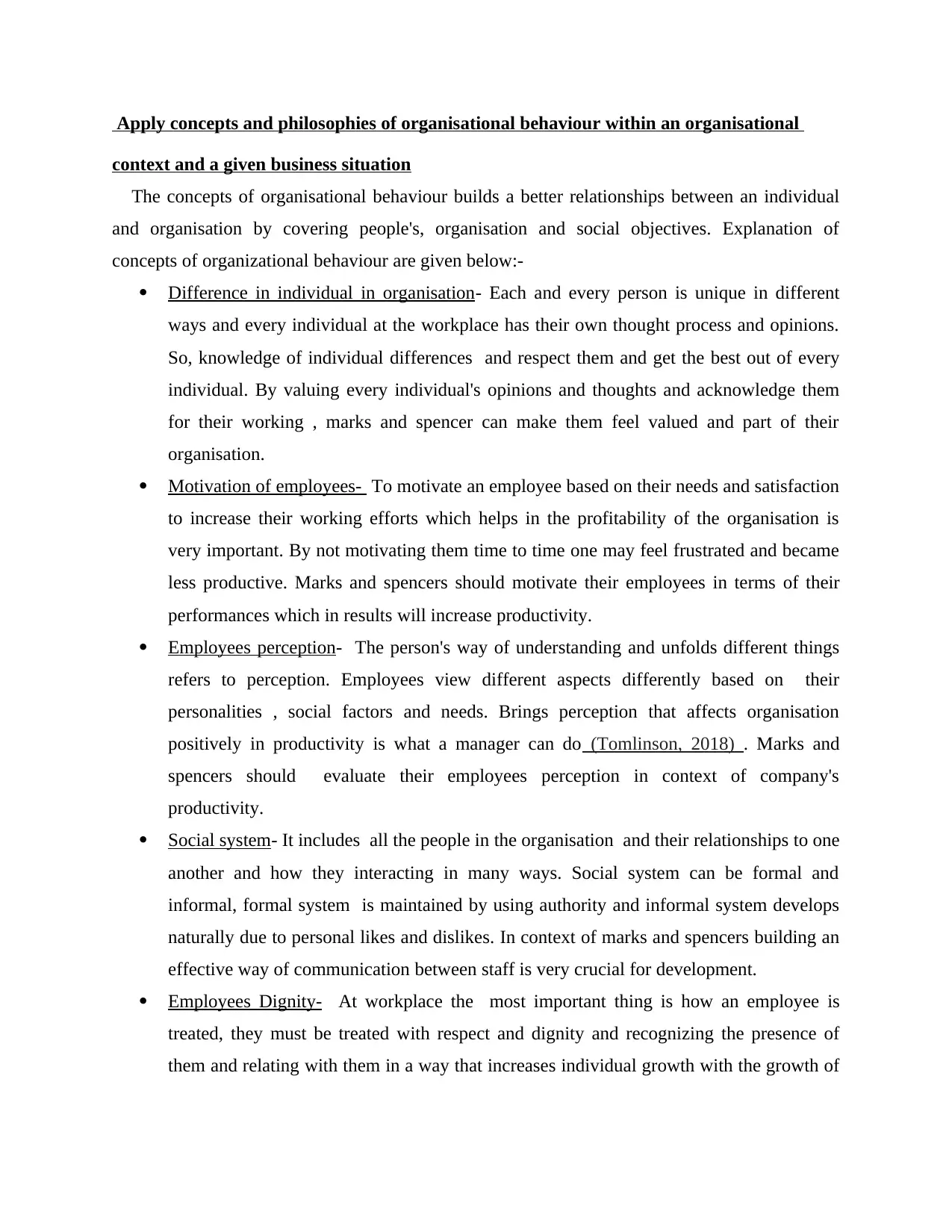
Apply concepts and philosophies of organisational behaviour within an organisational
context and a given business situation
The concepts of organisational behaviour builds a better relationships between an individual
and organisation by covering people's, organisation and social objectives. Explanation of
concepts of organizational behaviour are given below:-
Difference in individual in organisation- Each and every person is unique in different
ways and every individual at the workplace has their own thought process and opinions.
So, knowledge of individual differences and respect them and get the best out of every
individual. By valuing every individual's opinions and thoughts and acknowledge them
for their working , marks and spencer can make them feel valued and part of their
organisation.
Motivation of employees- To motivate an employee based on their needs and satisfaction
to increase their working efforts which helps in the profitability of the organisation is
very important. By not motivating them time to time one may feel frustrated and became
less productive. Marks and spencers should motivate their employees in terms of their
performances which in results will increase productivity.
Employees perception- The person's way of understanding and unfolds different things
refers to perception. Employees view different aspects differently based on their
personalities , social factors and needs. Brings perception that affects organisation
positively in productivity is what a manager can do (Tomlinson, 2018) . Marks and
spencers should evaluate their employees perception in context of company's
productivity.
Social system- It includes all the people in the organisation and their relationships to one
another and how they interacting in many ways. Social system can be formal and
informal, formal system is maintained by using authority and informal system develops
naturally due to personal likes and dislikes. In context of marks and spencers building an
effective way of communication between staff is very crucial for development.
Employees Dignity- At workplace the most important thing is how an employee is
treated, they must be treated with respect and dignity and recognizing the presence of
them and relating with them in a way that increases individual growth with the growth of
context and a given business situation
The concepts of organisational behaviour builds a better relationships between an individual
and organisation by covering people's, organisation and social objectives. Explanation of
concepts of organizational behaviour are given below:-
Difference in individual in organisation- Each and every person is unique in different
ways and every individual at the workplace has their own thought process and opinions.
So, knowledge of individual differences and respect them and get the best out of every
individual. By valuing every individual's opinions and thoughts and acknowledge them
for their working , marks and spencer can make them feel valued and part of their
organisation.
Motivation of employees- To motivate an employee based on their needs and satisfaction
to increase their working efforts which helps in the profitability of the organisation is
very important. By not motivating them time to time one may feel frustrated and became
less productive. Marks and spencers should motivate their employees in terms of their
performances which in results will increase productivity.
Employees perception- The person's way of understanding and unfolds different things
refers to perception. Employees view different aspects differently based on their
personalities , social factors and needs. Brings perception that affects organisation
positively in productivity is what a manager can do (Tomlinson, 2018) . Marks and
spencers should evaluate their employees perception in context of company's
productivity.
Social system- It includes all the people in the organisation and their relationships to one
another and how they interacting in many ways. Social system can be formal and
informal, formal system is maintained by using authority and informal system develops
naturally due to personal likes and dislikes. In context of marks and spencers building an
effective way of communication between staff is very crucial for development.
Employees Dignity- At workplace the most important thing is how an employee is
treated, they must be treated with respect and dignity and recognizing the presence of
them and relating with them in a way that increases individual growth with the growth of
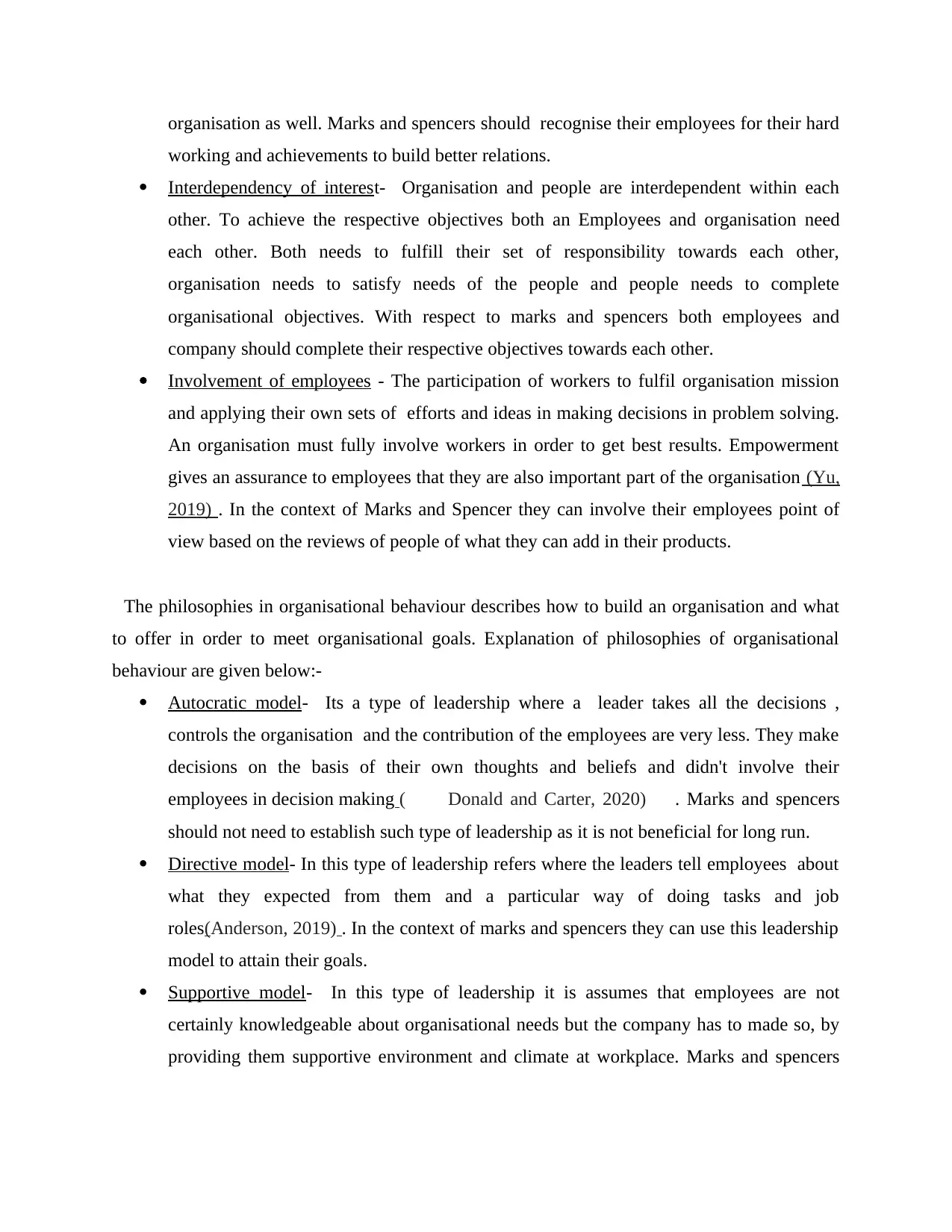
organisation as well. Marks and spencers should recognise their employees for their hard
working and achievements to build better relations.
Interdependency of interest- Organisation and people are interdependent within each
other. To achieve the respective objectives both an Employees and organisation need
each other. Both needs to fulfill their set of responsibility towards each other,
organisation needs to satisfy needs of the people and people needs to complete
organisational objectives. With respect to marks and spencers both employees and
company should complete their respective objectives towards each other.
Involvement of employees - The participation of workers to fulfil organisation mission
and applying their own sets of efforts and ideas in making decisions in problem solving.
An organisation must fully involve workers in order to get best results. Empowerment
gives an assurance to employees that they are also important part of the organisation (Yu,
2019) . In the context of Marks and Spencer they can involve their employees point of
view based on the reviews of people of what they can add in their products.
The philosophies in organisational behaviour describes how to build an organisation and what
to offer in order to meet organisational goals. Explanation of philosophies of organisational
behaviour are given below:-
Autocratic model- Its a type of leadership where a leader takes all the decisions ,
controls the organisation and the contribution of the employees are very less. They make
decisions on the basis of their own thoughts and beliefs and didn't involve their
employees in decision making ( Donald and Carter, 2020) . Marks and spencers
should not need to establish such type of leadership as it is not beneficial for long run.
Directive model- In this type of leadership refers where the leaders tell employees about
what they expected from them and a particular way of doing tasks and job
roles(Anderson, 2019) . In the context of marks and spencers they can use this leadership
model to attain their goals.
Supportive model- In this type of leadership it is assumes that employees are not
certainly knowledgeable about organisational needs but the company has to made so, by
providing them supportive environment and climate at workplace. Marks and spencers
working and achievements to build better relations.
Interdependency of interest- Organisation and people are interdependent within each
other. To achieve the respective objectives both an Employees and organisation need
each other. Both needs to fulfill their set of responsibility towards each other,
organisation needs to satisfy needs of the people and people needs to complete
organisational objectives. With respect to marks and spencers both employees and
company should complete their respective objectives towards each other.
Involvement of employees - The participation of workers to fulfil organisation mission
and applying their own sets of efforts and ideas in making decisions in problem solving.
An organisation must fully involve workers in order to get best results. Empowerment
gives an assurance to employees that they are also important part of the organisation (Yu,
2019) . In the context of Marks and Spencer they can involve their employees point of
view based on the reviews of people of what they can add in their products.
The philosophies in organisational behaviour describes how to build an organisation and what
to offer in order to meet organisational goals. Explanation of philosophies of organisational
behaviour are given below:-
Autocratic model- Its a type of leadership where a leader takes all the decisions ,
controls the organisation and the contribution of the employees are very less. They make
decisions on the basis of their own thoughts and beliefs and didn't involve their
employees in decision making ( Donald and Carter, 2020) . Marks and spencers
should not need to establish such type of leadership as it is not beneficial for long run.
Directive model- In this type of leadership refers where the leaders tell employees about
what they expected from them and a particular way of doing tasks and job
roles(Anderson, 2019) . In the context of marks and spencers they can use this leadership
model to attain their goals.
Supportive model- In this type of leadership it is assumes that employees are not
certainly knowledgeable about organisational needs but the company has to made so, by
providing them supportive environment and climate at workplace. Marks and spencers
⊘ This is a preview!⊘
Do you want full access?
Subscribe today to unlock all pages.

Trusted by 1+ million students worldwide
1 out of 15
Related Documents
Your All-in-One AI-Powered Toolkit for Academic Success.
+13062052269
info@desklib.com
Available 24*7 on WhatsApp / Email
![[object Object]](/_next/static/media/star-bottom.7253800d.svg)
Unlock your academic potential
Copyright © 2020–2026 A2Z Services. All Rights Reserved. Developed and managed by ZUCOL.




